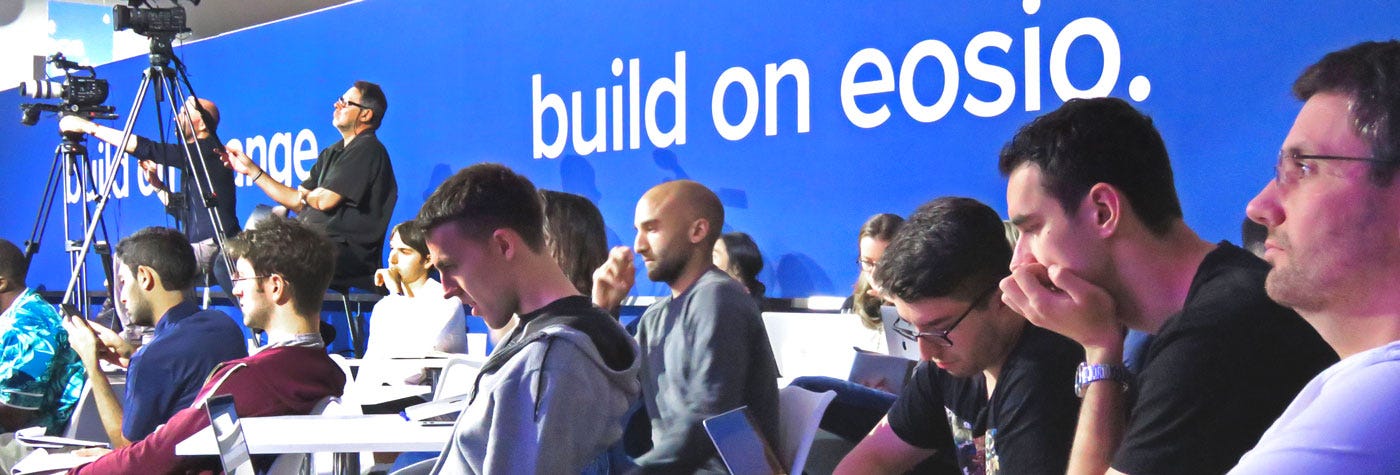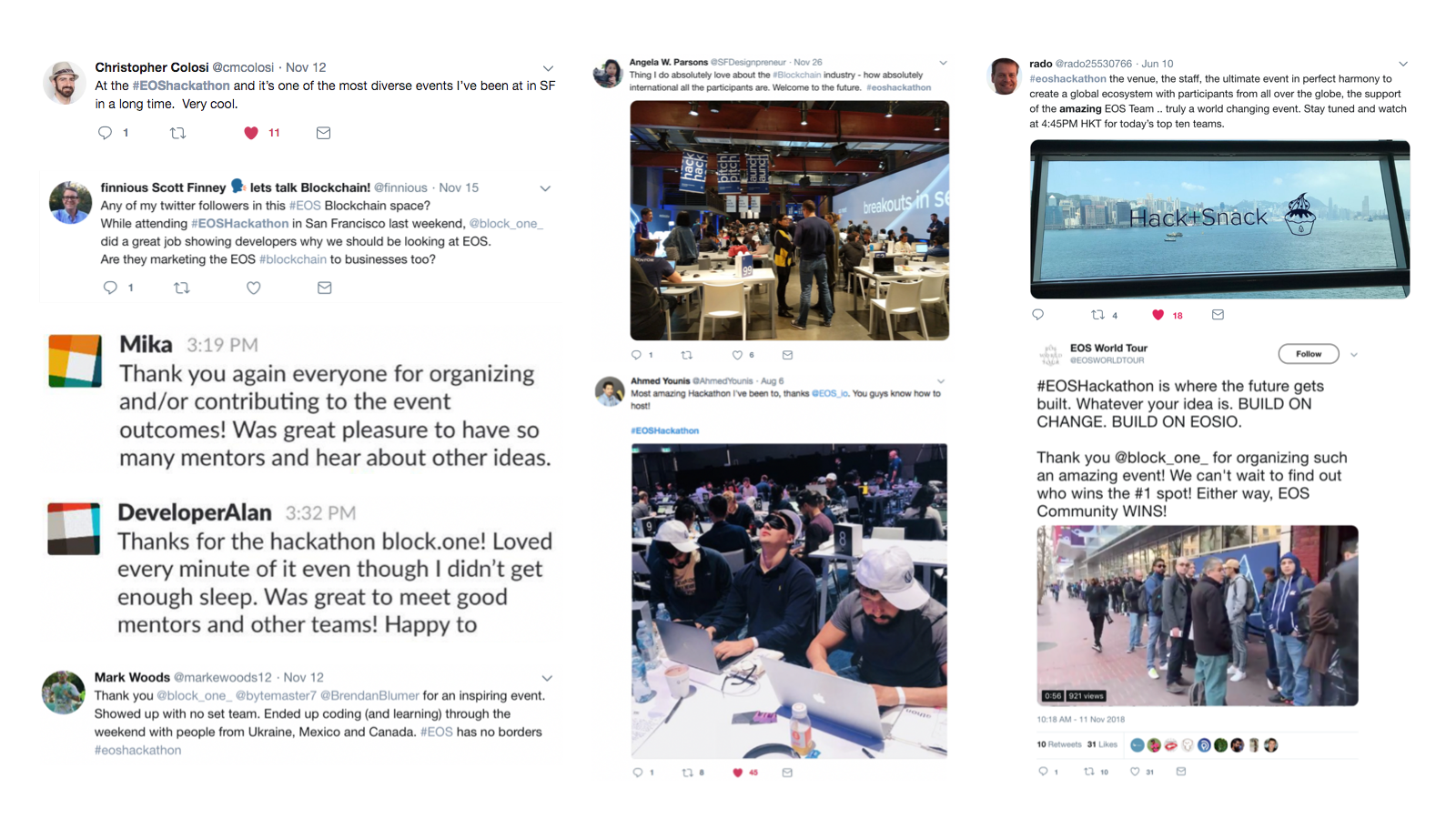
译文/Translated:
洲的中小型企业可以通过一个点对点平台合并到大公司去,消费者可以利用项目中黑名单系统避开恶意软件,印度公共招投标系统依靠某个项目可以创建透明度和实现问责度,没有高级计算机编码能力的科学家也能通过一定的解法实现绘制和监控环境变量,但把上述这些联系到一起的是什么?
答案是,上述所有的项目都建立在EOSIO平台上。这个免费的区块链软件协议比市场上任何一个同类产品的交易速度更快,延迟更低,同时,其架构师认为,EOSIO能加速区块链的大规模采用。
这些项目背后的团队以及其它15支新兴的技术黑马现在都聚在开普敦,它们要在那里参加Block.one的EOS全球黑客马拉松为期一周的决赛。
今年年初Block.one构想这个比赛的时候,它完全没想到比赛居然能激起全球EOSIO开发者和爱好者如此蓬勃的想象。
这个软件的开发以及Block.one后续对它的升级在区块链的发展中起到了重要的作用,早期应用该软件的一大波开发者也抓住了这个机遇。在科技领域,黑客马拉松很大程度上是一个自下而上的现象,在EOSIO这个事情上,它们刺激了平台的发展,而这个时候,平台正在成为越来越多组织首选的协议。
在开普敦的决赛之前,共有1800人次参加了前五场比赛:4次是分别在香港、悉尼、伦敦和旧金山举办的现场比赛,还有一次是十月在非洲举行的虚拟赛。Block.one的评委从这些比赛中分别挑选出三支获胜队,在现场比赛中还分别挑选一支最佳社会影响奖。最终决赛的获胜者将能获得50万美金的奖金,这样Block.one的风投部门EOS VC在整个比赛期间总计会颁发150万美元的奖金。
前面几场比赛中,选手们都需要在26小时内利用EOSIO代码库,创建区块链解法解决一个特定的问题。但是,决赛和预赛的形式不同。决赛中,参赛选手需要参加一个孵化周,这周结束后,他们的项目将在展示日被国际评委团评估,这个评委团成员都是全球科技和区块链的领导人。这一周中,选手们要参加讲座、了解各类知识,其中包括项目的可投资性、价值链和影响,他们还要分析区块链如何准确地融入他们的技术组和商业计划,最后还要完成他们的展示pitch。
这就是过去六个月中Block.one的导师、评委、专家、充满创意的合作人共同努力之后的结晶。然而,它的成功实际上是参与者表现出来的精力和热情的成果,不管参与的人是经验丰富的程序员还是彻底的小白。正如旧金山预赛的冠军团队NouGit的成员Rob Behnke所说,“EOS社区和我见过的所有区块链社区都不同。我们感受到的热情和兴奋几乎化为实质。”

这场比赛还让我们看到,任何一个有天分有想法的人都可以在区块链革命中占领一席之地。地球上没有哪个地方的事业是完全孤立的,EOSIO上很多最好的项目把技术专长和企业需求、现实问题结合在一起。
除了已经提到的决赛项目,还有一个项目的目标是鼓励个人通过一个安全、匿名的方式捐赠基因数据,从而推动阿尔茨海默病的研究。我们有个应用通过基于区块链的供给链管理避免食品浪费。我们还有个计划是想为十多亿没有身份文件的民众提供私人、可恢复、和完全由个人控制的身份ID。
来到开普敦的每支队伍都有自己的特色,对于区块链如何惠及世界,他们都有自己清晰的看法,但他们也都坚信区块链能够提升全球的数字基础设施。
对于Block.one来说,培养这些草根创新者、帮助他们开发自己的想法,这两个事情和EOSIO生态系统的不断扩张相辅相成。遗憾的是,EOS全球黑客马拉松只能有一个获胜者,但是,我们很明确,正在孵化的创业团队们带来的解决方法会让全球数十亿人获益。
原文/Original:
What connects a peer-to-peer platform that will allow African SMEs to merge into larger companies, a project to protect consumers from malware using a blacklisting process, another to create transparency and accountability in public tender systems in India, and a solution that gives scientists the tools to map and monitor environmental variables without having to possess advanced computer coding skills?
The answer is that all of these projects are being built on EOSIO, a fee-less blockchain software protocol which boasts faster transaction speeds and lower latency than any other on the market, and whose architects believe will hasten blockchain’s mass adoption.
Along with 15 other start-up outfits, the teams behind these ventures are currently in Cape Town, where they are competing in the week-long Grand Finale of Block.one’s EOS Global Hackathon series.
When the series was conceived in the early months of this year, Block.one could scarce have imagined how it would capture imaginations in a burgeoning global community of EOSIO developers and enthusiasts.
The software’s arrival and the ongoing improvements to it by Block.one have marked a significant development in the story of blockchain and it’s one that a broad community of early adopters has seized on. Hackathons are very much a bottom-up phenomenon in the tech sector and in the case of EOSIO they have galvanized momentum around the platform at a time when it is emerging as the protocol of choice for a growing number of organizations.
Almost 1800 individuals competed in the series’ five events prior to the Cape Town finale: four on-the-ground hackathons in Hong Kong, Sydney, London and San Francisco, and one pan-African Virtual Hackathon in October. Block.one’s judges selected three winning teams from each of those events, in addition to a Best Social Impact winner at each of the non-virtual events. A top prize of US$500,000 will be awarded in South Africa to one ultimate winner, taking total prize money dispensed during the series by EOS VC — Block.one’s venture capital arm — to US$1.5million.
The format of finale week is somewhat different to previous events, where teams were given 26 hours to create blockchain solutions — using the EOSIO codebase — that “hacked” a specific challenge. In Cape Town, finalists are part-way through an Incubation Week, at the end of which their projects will be assessed in a Demo Day by a panel of international judges that includes global technology and blockchain leaders. Throughout the week, they will listen to speakers and gain insights from mentors on everything from investability to value chains and marketing, dissect exactly how blockchain fits into their tech stacks and business plans, and hone their pitches.
All of this is the culmination of a mammoth six-month endeavor involving a cast of mentors, judges, Block.one’s own experts and various creative partners. Its success however is really a product of the energy and passion shown by participants, from accomplished programmers to complete novices. As Rob Behnke, a member of NouGit — the winning team in San Francisco — commented: “The EOS community is unlike anything I’ve seen in blockchain. You can cut the excitement with a knife.”

What the series also shows is that anyone with talent and ideas can play a part in the blockchain revolution. Nowhere on this planet has a monopoly on enterprise and the genius of many of the best projects building on EOSIO is in combining tech expertise with entrepreneurial drive and initiative to address real-world issues and problems.
Besides the finalists already mentioned, another project is aimed at incentivizing individuals to donate genomics data in a secure, anonymized way to further research into Alzheimer’s disease. There is an application designed to prevent food wastage through blockchain-based supply chain management, and an initiative to offer one billion-plus citizens with no formal documentation of their identity a way to establish a trusted ID that is private, recoverable and fully under their control.
Each in their own way, the teams in Cape Town demonstrate a clear-sighted vision of how blockchain can benefit the world and a belief in its ability to upgrade to our global digital infrastructure.
For Block.one, nurturing these grass-roots innovators and helping them to grow their ideas creates synergies with the ongoing expansion of the EOSIO ecosystem. Unfortunately there can be only one winner in the EOS Global Hackathon — but it’s clear that the start-ups it is incubating this week offer solutions that stand to benefit billions around the world.
原文链接/Original URL: